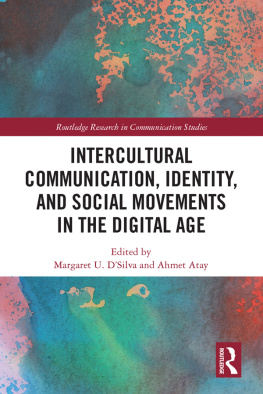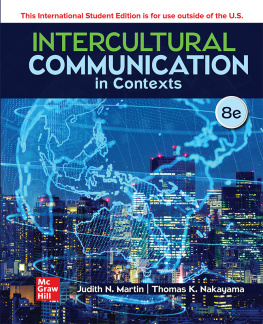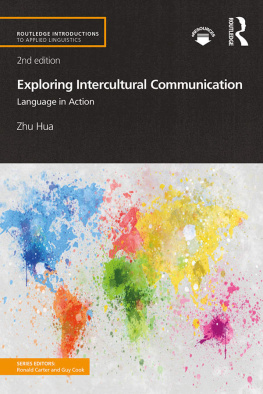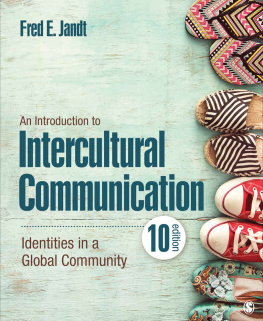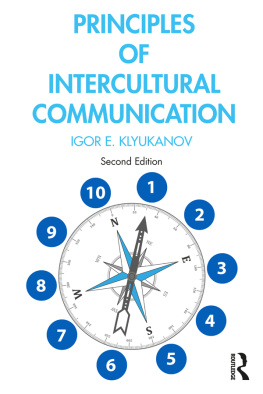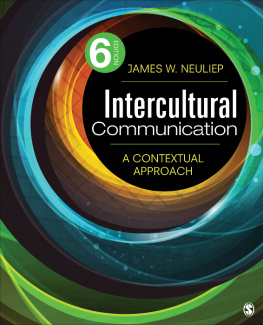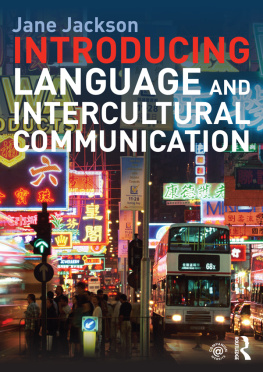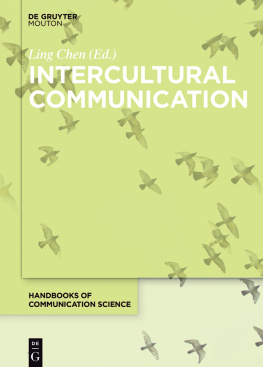Intercultural Communication and IdeologySAGE has been part of the global academic community since 1965, supporting high quality research and learning that transforms society and our understanding of individuals, groups, and cultures. SAGE is the independent, innovative, natural home for authors, editors and societies who share our commitment and passion for the social sciences.
Find out more at: www.sagepublications.com
Intercultural Communication and Ideology
Adrian Holliday
2011 Adrian Holliday
First published 2011
Apart from any fair dealing for the purposes of research or private study, or criticism or review, as permitted under the Copyright, Designs and Patents Act, 1988, this publication may be reproduced, stored or transmitted in any form, or by any means, only with the prior permission in writing of the publishers, or in the case of reprographic reproduction, in accordance with the terms of licences issued by the Copyright Licensing Agency. Enquiries concerning reproduction outside those terms should be sent to the publishers.
SAGE Publications Ltd
1 Olivers Yard
55 City Road
London EC1Y 1SP
SAGE Publications Inc.
2455 Teller Road
Thousand Oaks, California 91320
SAGE Publications India Pvt Ltd
B 1/I 1 Mohan Cooperative Industrial Area
Mathura Road, Post Bag 7
New Delhi 110 044
SAGE Publications Asia-Pacific Pte Ltd
33 Pekin Street #02-01
Far East Square
Singapore 048763
Library of Congress Control Number: 2010928263
British Library Cataloguing in Publication data
A catalogue record for this book is available from the British Library
ISBN 978-1-84787-386-6
ISBN 978-1-84787-387-3 (pbk)
Typeset by C&M Digitals (P) Ltd, Chennai, India
Printed by CPI Antony Rowe, Chippenham, Wiltshire
Printed on paper from sustainable resources
Contents
List of Figures
List of Tables
Preface and Methodology
This book will look at intercultural communication against the backdrop of an unequal global politics in which ideology plays a major role. It will consider the way in which popular narratives of culture lead us easily and sometimes innocently to the reduction of the foreign Other as culturally deficient. Means for countering this cultural prejudice will be sought in an awareness of how culture and prejudice operate in everyday life. The aim will be the development of a sociological imagination which understands the politics of the usthem of how culture works. It will critique a common, established idea that (a) intercultural communication is problematic because of the meeting of normally national cultures which have very different yet ostensibly equal psychological underpinnings, values and forms of communication, and that (b) the problem can be somehow solved by a close investigation of these characteristics and the subsequent education and training of the interactants. The alternative approach growing out of this critique will be that this perception of difference and its solutions is itself the product of a Centre, Western, chauvinistic ideology of superiority. This is not to deny cultural difference, nor the importance of nation, but to place it at a deeper level of complexity which transcends the fixity of a Centre-Western concept of nation.
Whether a particular chapter is about global or personal politics, the nature of culture or of communication, the discussion will be brought back to particular interpersonal instances. Examples of intercultural behaviour, based on reconstructed ethnographic observation, will provide a focus around which the discussion can be arranged and made accessible and generate suggestions for action in the investigation section at the end of each chapter. An empirical base will be provided by interviews with people caught at the intersection of cultural experience, description of intercultural events in everyday life, and the authors own personal narrative of an intercultural voyage through a series of international locations.
The book will aim to reach both academic and professional audiences. It will be suitable for undergraduates and postgraduates following degree courses in intercultural communication, and cultural studies, and a range of professionals undertaking training in intercultural communication. It will also inform trainers, lecturers, theorists and researchers. Each chapter will attempt to satisfy the interests of this broad readership. Although firm outcomes will be presented, the overall tenor of the book will be to involve the reader in an exploration of issues that face us all in everyday life.
presents a methodology for learning how to avoid prejudice in more effective intercultural understanding, which will be used throughout the book. While this is employed implicitly in the discussion of experiences and texts in each chapter, it is present in explicit form in the extended investigation section at the end of each chapter in which readers are invited to carry out intercultural investigations based on the principles discussed in the chapter in question. An important aspect of the tasks is a movement from discussion of intercultural issues at the more expected national level to what goes on between people generally, wherever they are and wherever they come from. This movement represents an important principle, promoted throughout the book, that intercultural issues and the connection with ideology and indeed race are all around us within every society. The investigatory tasks are thus intended to generate discussion and to introduce a sense of problem-solving throughout the book, and the application of a strong interpretive methodology for critical cultural awareness. Each investigatory section concludes with planning an intercultural orientation session.
Research Methodology
As well as presenting a methodology for critical cultural awareness, the book is also the product of social research. This does not pretend to be objective in the commonly understood scientific sense; indeed its significance is that it breaks from the established, largely linguistic methods of intercultural communication studies. I employ a postmodern, critical qualitative approach to the analysis of interview data, the details of which are described in of possible ways and then claim significance in that. The rigour is in the cautious self-consciousness with which I do this, and in the recognition of the way it makes sense within a broader thick description. The validity is also in the resounding fact that what these informants had to say deeply shook the assumptions with which I began the book. While I began with the intention of completely overthrowing the notion of national culture, they led me into unexpected areas of understanding and to acknowledge the cultural realism the power of national influences which is nevertheless mediated by powerful personal cultural realities which forms the basis of my approach. A difficult task was to steer a coherent line of discussion through the immense complexity of material which they produced. Readers will wonder why I did not pause more to talk about the broader issues of identity which they raise. Researchers will also be aware of the need to strike a balance between multiplying themes and a single agenda if they are ever going to finish what they have to say. There is therefore a richness emerging from my informants, and also from my other examples, which has a life of its own and from which readers will develop their own impressions and trajectories. The investigations at the end of each chapter are just the beginning of an invitation for such personal exploration.





